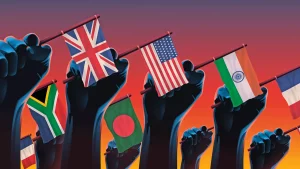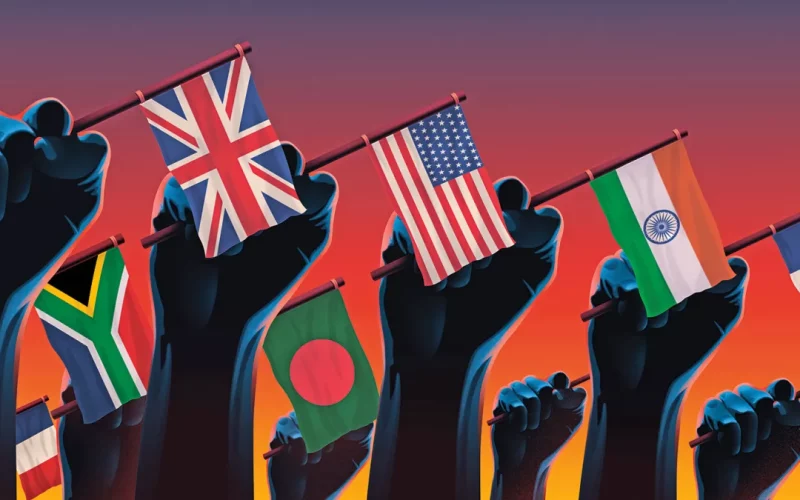Nationalism, a potent force in shaping political landscapes, has a profound impact on the global order. As countries increasingly turn inward, prioritizing national interests over international cooperation, the balance of power and global stability face significant challenges. This article explores the resurgence of nationalism, its implications for the world order, and the potential consequences of this trend.
The Rise of Nationalism

Historical Context
Nationalism is not a new phenomenon; it has deep historical roots. In the 19th and early 20th centuries, nationalism played a crucial role in the formation of modern nation-states and the decolonization process. However, the aftermath of World War II saw the establishment of international institutions aimed at fostering cooperation and preventing conflict, such as the United Nations and the European Union.
Modern Resurgence
In recent years, nationalism has seen a resurgence. Factors such as economic inequality, cultural shifts, and political disillusionment have contributed to this revival. Populist leaders and movements have capitalized on these sentiments, promoting policies that prioritize national sovereignty and identity.
Impact on International Relations
Erosion of Multilateralism
One of the most significant impacts of rising nationalism is the erosion of multilateralism. International agreements and organizations, which rely on the cooperation of multiple nations, are increasingly undermined. For example, the United States’ withdrawal from the Paris Agreement under the Trump administration highlighted how nationalist policies can disrupt global efforts to address climate change.
Trade and Economic Policies
Nationalist policies often manifest in protectionist trade measures. Tariffs, trade wars, and the renegotiation of trade agreements, such as Brexit, disrupt global trade networks and create economic uncertainty. This shift towards protectionism can lead to economic stagnation and reduce the benefits of globalization.
Political Consequences
Strain on Alliances
Nationalism can strain traditional alliances. NATO, for instance, has faced internal tensions as member countries prioritize national defense over collective security. The concept of shared responsibility, which underpins many international alliances, is challenged by nationalist rhetoric.
Regional Conflicts
Nationalist ideologies can exacerbate regional conflicts. In places like Eastern Europe and South Asia, nationalist sentiments have fueled territorial disputes and ethnic tensions. The resurgence of nationalism often leads to a zero-sum approach to international relations, where one nation’s gain is perceived as another’s loss.
Societal Implications
Xenophobia and Social Division
Nationalism can also lead to increased xenophobia and social division. Policies that emphasize national identity often marginalize minority groups and immigrants. This can result in social unrest and a decline in social cohesion, undermining the stability of societies.
Human Rights Concerns
The focus on national sovereignty can sometimes come at the expense of human rights. Nationalist governments may prioritize security and order over individual freedoms, leading to authoritarian practices. This can weaken the global human rights framework established in the post-war era.
Case Studies
United States
The rise of nationalism in the United States, particularly during the Trump administration, provides a clear example of its impact. Policies such as the “America First” agenda and the imposition of tariffs on China illustrate how nationalism can disrupt international cooperation and economic stability.
European Union
Brexit is a prominent example of nationalist sentiment leading to significant political change. The UK’s decision to leave the EU has had far-reaching implications for both the UK and the EU, affecting trade, immigration, and political dynamics within Europe.
India
In India, nationalist policies under Prime Minister Narendra Modi have led to increased tensions with neighboring countries and internal divisions. Policies such as the Citizenship Amendment Act have been criticized for discriminating against Muslims, highlighting how nationalism can lead to social and political strife.
Analysis Table
| Aspect | Impact of Nationalism |
|---|---|
| Multilateralism | Erosion of international agreements and organizations |
| Trade | Increase in protectionist measures, trade wars |
| Alliances | Strain on traditional alliances like NATO |
| Regional Conflicts | Exacerbation of territorial disputes and ethnic tensions |
| Xenophobia | Rise in xenophobic attitudes and social division |
| Human Rights | Potential erosion of human rights and democratic norms |
Comparative Table
| Country/Region | Nationalist Policy Examples | Consequences |
|---|---|---|
| United States | America First, tariffs on China | Disruption in international trade, strained global relations |
| European Union | Brexit | Economic uncertainty, impact on EU cohesion |
| India | Citizenship Amendment Act, increased border tensions | Social division, regional instability |
Conclusion
The resurgence of nationalism poses a significant threat to the world order. By undermining multilateralism, disrupting trade, and straining alliances, nationalist policies challenge the foundations of global stability. Additionally, the societal implications, including increased xenophobia and potential erosion of human rights, highlight the broader consequences of this trend.
Addressing the rise of nationalism requires a nuanced approach. It is essential to understand the underlying causes and address the legitimate concerns of citizens while promoting the benefits of international cooperation and solidarity. Only by balancing national interests with global responsibilities can we ensure a stable and prosperous world order.












